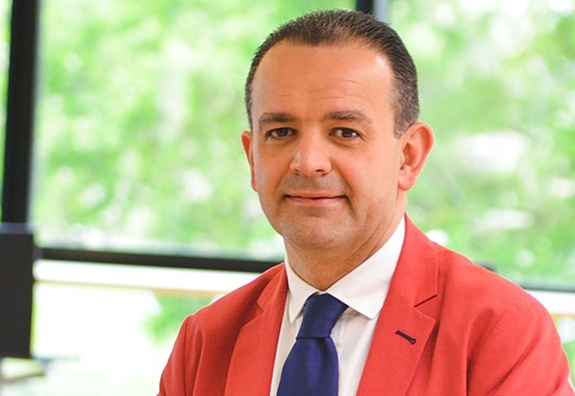Interview with Vincenzo Esposito Vinzi, Dean of Faculty and Acting Dean and President of ESSEC
5.10.2017

An English reproduction of the original piece [https://lepetitjournal.com/singapour/education/entretien-avec-vincenzo-esposito-vinzi-directeur-general-par-interim-156105] is presented below :
Professor Vincenzo Esposito Vinzi, Dean of Faculty and Acting Dean and President of ESSEC Business School reaffirmed in Singapore that he subscribes to the continuity of the school’s current strategy, and announced that ESSEC would be taking part in the France-Singapore Year of Innovation in 2018.
Professor Vincenzo Esposito Vinzi has been the Acting Dean and President of ESSEC Business School since 19 May 2017, following the departure of Jean-Michel Blanquer, who was appointed Minister of National Education.
He was in Singapore in september for an academic visit, meeting the teaching staff and the significant community of alumni, and institutionally with, as a high point, our ambassador, Mr. Marc Abensour, in preparation for the France-Singapore Year of Innovation in 2018.
You are Acting Dean of ESSEC. Can you tell us more about the process of appointing the future Dean?
Vincenzo Esposito Vinzi - Following the departure of Jean-Michel Blanquer, who was appointed Minister of National Education on 17 May 2017, and in accordance with the school’s statutes, a selection committee for candidates for the role of C.E.O. has been formed. It comprises seven members representing ESSEC’s main factions: these include the Paris-Île-de-France Chamber of Commerce, teachers, former pupils, and the Catholic Institute of Paris. A headhunter has been recruited and an international appeal for candidacies was launched last June.
The supervisory council of ESSEC presided over by Mr. Thierry Peugeot, will designate the group’s C.E.O. The list of candidates has been drawn up but remains confidential, and no date is fixed for this nomination.
What are your vision and your strategy for ESSEC during this period of transition?
Vincenzo Esposito Vinzi - I subscribe to the continuity of the strategic plan put in place by Jean-Michel Blanquer, and the consolidation of projects in progress. The strategic plan “ESSEC 3i” anchors together with the three pillars of Innovation, Internationalisation, and Involvement that structure our ambition and our pioneer spirit. It is important today to reassure the inner and outer community of ESSEC by guaranteeing this continuity.
ESSEC is a school of world-class stature and wants, in its mission, to have a global impact. This is demonstrated on the one hand, by our presence on the world stage – with this Asia-Pacific campus here in Singapore and the new Africa-Atlantic campus in Rabat in Morocco, which was planted in the Spring of 2017. And on the other hand, by an internationalization at the very heart of ESSEC. In fact, today, a majority of our faculty are international, approximately 31% of our student body are international students who come from 96 different countries, plus 182 partners in 45 countries, and 29 double diplomas of which 24 are international.
How would you define ESSEC’s “pioneering spirit”?
The pioneering spirit, which I also like to call the spirit of conquest, is an anticipatory state of mind; an ability to prepare for the new tendencies of the future. Three elements are essential, namely; risk, knowing how to take calculated risks to prepare for the future; respect, so that the risks and the decisions taken will be sustainable and lasting; and responsibility, in order to take responsibility for one’s actions and the decisions we make as pioneers.
ESSEC has a mission to transmit knowledge to students, but also to create new knowledge through research at the level of the teaching staff. That, too, is the pioneering spirit.
How will ESSEC contribute to the France-Singapore Year of Innovation?
ESSEC’s participation in the year of innovation between France and Singapore was the object of our meeting with the ambassador, Mr. Abensour. We are going to play an important part in this initiative, for it corresponds to the values and the strategic plan of our school. We have strong skills in innovation that we wish to share.
We are going to put in place a series of events that will allow us to involve students and teachers, but also local and global economic partners and the general public.
I think that what differentiates a business school today is precisely this aptitude for creating “business solutions”, by means of integration and continuous exchanges with the different partners. Bringing political and economic figures onto the campus allows interaction and the creation of new solutions, in order to respond to the needs of society.
Moreover, so as to ensure all the changes around the Year of Innovation has a lasting impact, we are considering writing a charter or white paper for innovation with all the partners.
In Singapore, the government is uniting its efforts in terms of innovation, digital, and new technologies in the “Smart Nation” initiative. Does ESSEC subscribe to this move?
Among the pillars that characterize our presence in Singapore, there is undeniably the ‘Innovation’, of which we have just discussed, but also ‘Digital Business’ and ‘Smart Life and Smart Economy’. Our two centres of excellence that mirror these two specific topics are in close harmony with the poles of excellence of Singapore and Smart Nation.
In line with this strategy of Smart Nation digital transformation, ESSEC Asia-Pacific wants to provide the leaders of tomorrow with the latest knowledge in digital, innovation, new technologies, and intelligent economy in a global environment.